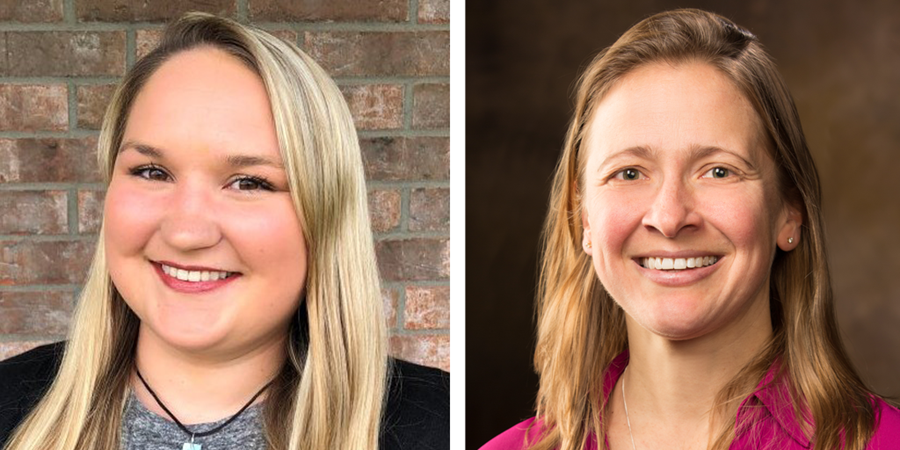Startup Awarded $1 Million Grant for Water Cleaning Technology
FAYETTEVILLE, Ark. – A University of Arkansas-based startup has been awarded more than $1 million from the Department of Defense to use chemical engineering methods to remove explosives from water.
CatalyzeH2O, an engineering firm that creates nanotechnology and electrochemical solutions for clean water, was awarded a $1.1 million Department of Defense contract with the U.S. Army.
The company was founded by Shelby Foster, a doctoral student in the Ralph E. Martin Department of Chemical Engineering, and Lauren Greenlee, an associate professor of chemical engineering. Foster is the company’s CEO, while Greenlee serves as a technical adviser.
The group’s Department of Defense grant centers on designing a more efficient and less expensive system to remove explosives from water.
“We are looking to remove explosives from water at production facilities,” Foster said. “Explosives are often kept in solution for safer handling of the compounds. However, explosives can also be found in both soil and groundwater after use.”
Foster said groundwater contamination can lead to health issues in impacted areas.
“The explosives will be detonated, contaminating the soil and surrounding ground,” she said. “Rainfall will interact with the explosives in the ground and soil, leading to leaching of the compounds into the groundwater. The two explosives we are looking at removing are carcinogenic and often lead to other adverse health effects in mammals.”
CatalyzeH2O’s method destroys explosives in the water supply, as opposed to current approaches that only remove the explosives.
The two current solutions on the market both take time and a large capital investment due to operational costs, Foster said.
CatalyzeH2O’s solution is a catalyst-embedded nanoporous material, known as a CNpM. The CNpM will be able to detect, sequester and remediate explosive materials in water.
“The biggest advantage our CNpM has over other technologies is the ability to destroy the explosives in water,” Foster said. “The most common treatment methods often rely on only removing the explosive from the water, but then you still have the explosive somewhere – either in a concentrated stream (membranes) or on the surface of the material (filter media).
Foster said the approach is more cost-effective than current methods.
“The only method that can directly compete with destroying the explosives is a biological remediation pond, but these are very large investments,” she said. “Our technology will have a smaller footprint and price tag as compared to a biological remediation system. The CNpM will also require less of a capital investment than current solutions on the market.”
Over the next year, CatalyzeH2O will focus on optimizing the manufacturing of its CNpM composite and testing it in different water sources.
“We are focused on optimizing our manufacturing process and the composite over the next year,” Foster said. “Once these two factors are addressed, we will begin to pilot our composite on different water streams. In tandem, we will begin laboratory studies on similar compounds often found in water in the industrial sector to be able to transition our composite into different industries.”
About the University of Arkansas: As Arkansas' flagship institution, the U of A provides an internationally competitive education in more than 200 academic programs. Founded in 1871, the U of A contributes more than $2.2 billion to Arkansas’ economy through the teaching of new knowledge and skills, entrepreneurship and job development, discovery through research and creative activity while also providing training for professional disciplines. The Carnegie Foundation classifies the U of A among the top 3% of U.S. colleges and universities with the highest level of research activity. U.S. News & World Report ranks the U of A among the top public universities in the nation. See how the U of A works to build a better world at Arkansas Research News.
Topics
Contacts
Andy Albertson, senior director of communications
Research and Economic Development
479-871-9653,
aalbert@uark.edu
Headlines
Native American Student Association to Host Annual Choctaw Stickball Tournament
Competition begins at 10 a.m. Saturday the the University Recreation fields on Razorback Road. Carly Keats, a star Razorback basketball player, will play for her home team from Choctaw, Mississippi.
Department of Music Professor to Teach at Italian Festival in June
Richard Rulli, associate professor of trumpet in the Department of Music, has been invited to teach at TrumpetFest June 16-23 in Orvieto, Italy.
Bumpers College Names Senior Scholars, Outstanding Departmental Students
Twenty-five students from 10 different majors and concentrations in Bumpers College were named Senior Scholars for 2023-24, and each department has named its outstanding students for the year.
Music Education Students Bring Fun to Child Development Center
Interactive music sessions known as "music zoos" bring creative learning of musical instruments to the children in the center, as well as providing the music education students the chance to practice their teaching skills.
New Faculty Teaching Portfolio Authors Recognized
The faculty members successfully completed the Teaching Portfolio and will be recognized at the Fall Teaching Awards ceremony hosted by the Cordes Teaching and Faculty Support Center and the Teaching Academy.





